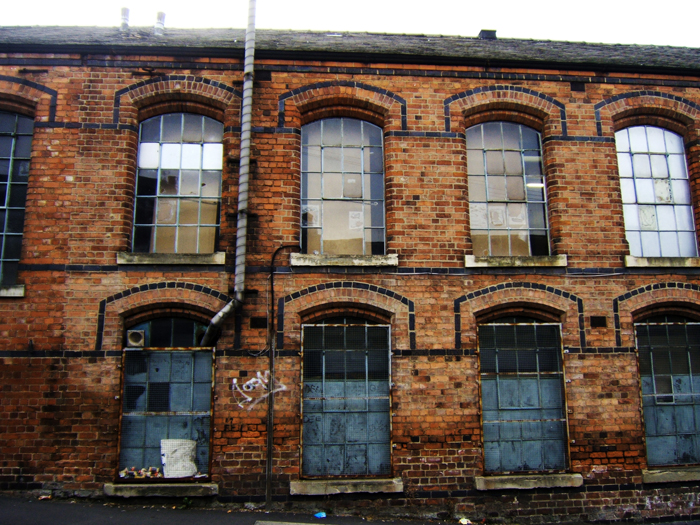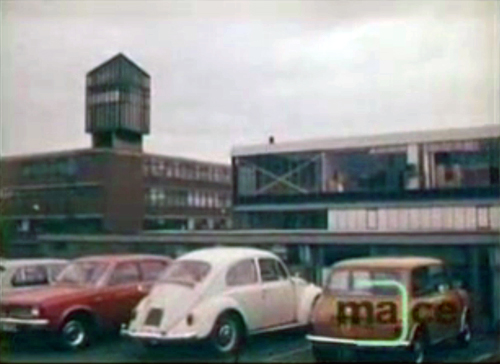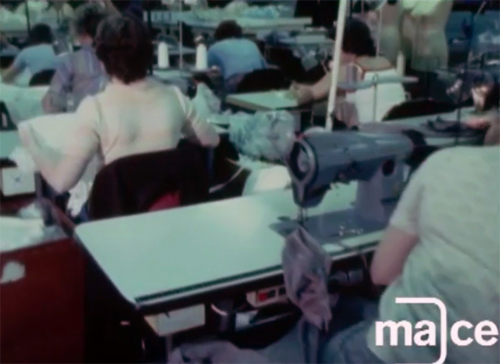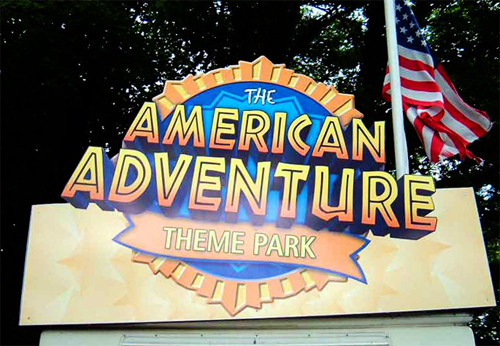Explore Ilkeston’s history, economy, and resilience, from its spa town past to the challenges of the modern high street in the topsy-turvy digital age.
If you already live or work here in Ilkeston, you probably don’t need me to tell you about the history and economy of the town, though there might be one or two things I’m going to cover on this page you don’t know!
Contents
📍 Position and Locale
📊 Dwindling Economy
⛲ Spa Town
⚒️ Stanton: Gone But Not Forgotten
🧵 Charnos
🎢 American Adventure
🛟 Our Suffering High Street
🏚️ Is Amazon Killing Jobs and Destroying Communities?
♥️ Local Pride
🛤️ Reopening of the Railway Station
🥊 Being the Underdog
🏅 Notable Independent Businesses in Ilkeston
🖥️ Getting Online
Position and Locale 📍
As you are perhaps aware (or maybe not if you’re new to the area), Ilkeston is a post-industrial market town situated between Derby, Nottingham and Alfreton.
Many people who live here travel elsewhere to work although there are still lots of local businesses, big and small, employing some of the population.
The Office for National Statistics considers Ilkeston to be part of the Nottingham Urban area, aka Greater Nottingham, and it is often the case that Ilkestonians reply “Nottingham” when asked where they come from.
We are technically in Derbyshire but right on the county border, only 9 miles from Nottingham city centre.
Indeed, we do have the 0115 telephone area code associated with Nottingham instead of the 01332 area code for Derby.
Dwindling Economy 📊
The former glory of “Ilson” lay mainly in coal, iron and textiles. These traditional industries have all disappeared as a result of creeping globalisation and changing market forces.
It’s the same story for many similar places across the country.
Spa Town ⛲
Back in Georgian times, spa towns like Harrogate, Cheltenham and Leamington were gentrified tourist hotspots. As a supposed cure-all, the availability of natural underground mineral water for drinking and bathing was a revenue-generator, hence the building of public baths.
A spa was discovered in Ilkeston sometime around the 1830s, and the main high street, previously “Town Street”, had the honour of being renamed “Bath Street”.
The water was examined and positively endorsed by doctors as a means to curing ills like gout and rheumatism. This water went on sale locally as well as at Derby, Belper, Bakewell, Ockbrook and Nottingham.
Ilkeston was set to become a so-called spa town and therefore a health resort of the time, but failed to do so after the spring water disappeared briefly.
The Ilkeston Baths were demolished in 1899.
Stanton: Gone But Not Forgotten ⚒️
The town’s largest employer of local labour in the area – Stanton Ironworks – ceased production in 2007 after some 160 years of history providing employment locally.
Stanton Ironworks was established in 1846, close to the Nutbrook Canal, but following financial struggles was taken over by the Crompton family and renamed “The Stanton Iron Company”, also establishing a new site (“the new works”) alongside the Erewash Canal.
The swift expansion led to the production of concrete pipes, cast-iron tunnel segments and involvement in major civil engineering projects such as the London Underground.
If you know anyone old enough to remember it, or indeed to have worked there, you’ll know just how important it was to Ilkeston. At its height, Stanton employed around 7,000 people and most former employees say it was gruelling.
Robert Lindsay, who worked there before becoming an actor, described Stanton as “hell”, with its deafening noise, lack of space, sense of danger and men not wearing safety helmets, smoking cigarettes with sleeves rolled up.
Wartime production included shell casings during the 1914-18 conflict and the same again during World War 2 plus bomb casings, gun barrels, and concrete air-raid shelter components.
After the war, Stanton was nationalised, privatised and re-nationalised. During the early 1980s Stanton was privatised for the final time, becoming part of the French Pont-a-Mousson Group and later, Saint Gobain.
Stanton continued to operate in Ilkeston but reached its conclusion when the final concrete pipe was cast on May 24th, 2007.
The company is commemorated throughout the UK and internationally by the many thousands of manhole covers and concrete street lamp standards bearing the words “Stanton” or “Stanton and Staveley”.
Below is someone’s YouTube video from 2015 showing the remaining buildings and disused railway lines.
Charnos 🧵
Rolf Noskwith, son of Eastern European Jewish parents who had lived and worked in Germany, founded Ilkeston’s best-known clothing manufacturer. Because of the worsening political situation, they sold their textile business and moved to England in 1932.
Charnos arrived on Corporation Road in 1936 and became one of the main employers. The factory is now long gone, replaced by housing.
Watch the Charnos carpark video here.
Watch the Chris Tarrant video here.
Leicestershire-based knitwear firm Richard Roberts bought the Charnos brand in January 2002, despite being axed as a supplier to M&S in 1999.
The products sold to Marks and Spencer accounted for 70% of the high street retailer’s knitwear division. In an attempt to reduce supply costs by £450m, Marks began outsourcing overseas where it was cheaper.
Alas, the fashion retail market now belongs to the globalised economy, making British-made suppliers of good quality stock disenfranchised. The likes of Mexico and Bangladesh rule, the latter being where my M&S trousers are made!
The Charnos brand took to the internet in 2011 as an eCommerce website and supplier for retailers but no longer has anything to do with Ilkeston.
American Adventure 🎢
The American Adventure opened in Ilkeston June 1987.
The popular theme park was built on the foundations of the Britannia park, which lasted only a couple of years. The Anglophile subject matter of Britannia was discarded in favour of the American West and was actually really well done.
Notable memories: the log flume, three roller coasters (Missile, Buffalo, Runaway Train), miniature railway and wild west scripted drama with gunslingers and horses.
The ground on which the park was built was plagued with subsidence problems. Together with falling visitor numbers and poor financial performance, the American Adventure closed in 2006.
It could have been a major UK tourist attraction had it been better managed. It would have been a decent long-term employer and may have expanded.
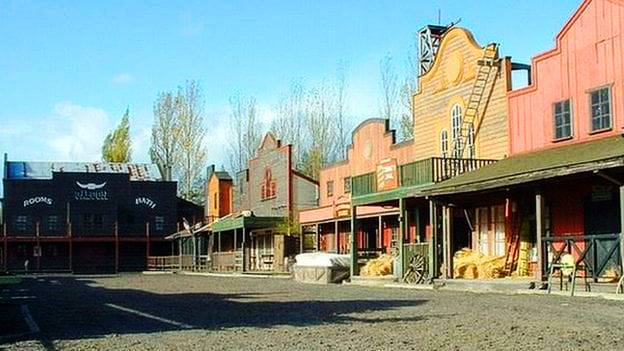
Silver City, American Adventure
Dog walkers, ramblers and curious locals would often squeeze through a hole in the fence to explore the remains of the park, perhaps retracing their steps from the past or imagining a time when the area would have been packed with visitors.
Nature had begun to take its course as the undergrowth reclaimed the abandoned site with wildlife existing alongside the ghostly shells of gutted buildings looking faintly post-apocalyptic.
The rides, by this time, had been sold off to other theme parks both home and abroad, but scattered around the grounds were reminders of more exciting times.
Picture filthy upturned river rapids, piles upon piles of bricks and the redundant colliery behind wrought iron padlocked gates.
Planning permission for homes, offices, hotel and leisure facilities was sought and, at the time of writing, the land is being bulldozed.
A YouTube channel dedicated to abandoned theme parks uploaded the following video in 2017 showing what’s left of the American Adventure:
Our Suffering High Street 🛟
The large Marks and Spencer left Bath Street in the 1990s but has since returned under the guise of M&S Food with a clothing department at Riverside retail park.
Woolworths closed in 2008 and the building eventually became home to a social enterprise project called The Project.
The local Co-op closed down, and the building converted into a new retail arcade now home to independent local retailers.
The Death of Buying Local?
Youth, energy and prosperity have been ceded to cities like Nottingham and Derby.
In September 2018, the Office for National Statistics said that online retailing had accounted for almost 18% of the entire retail sector. Said another way, in every £5 spent by retail consumers, nearly £1 of that is online.
Is Amazon Killing Jobs and Destroying Communities? 🏚️
Is it fair to say the rise of the internet mega-monopolies like Amazon are responsible for the decline of the high street?
It’s part of it, for sure.
Price Wars: No One Wins
Ilkeston used to have a fantastic high street and you could buy most of what you could need or want, but rising from the ashes of the classic high street experience is the bargain basement store that piles high and sells cheap.
Low wages for workers and wafer-thin profit margins makes this model barely viable, as seen with many big retailers.
Local Pride ♥️
The resurgence of local pride by the acclaimed Ilkeston Life newspaper is a triumph for the community and has been championed by the U Choose Smoothie Bar owner Paul Opiah.
It has been enthusiastically received by the community. It has also built the familiarity and reputation of the U Choose Smoothie Bar.
The answer to a revitalised local community may not be shops, but a mixture of things including social meeting places with a focus on whatever the residents care about.
Can we turn physical and digital spaces into something more than they are typically used for?
Reopening of the Railway Station 🛤️
Originally the canals were the means by which goods were transported, but in the 1800s the Erewash railway line was financed for the purposes of carrying coal.
It’s hard to believe Ilkeston has had a total of four stations from the mid 19th century to the mid 20th century, three of which were closed during the 1950s and 1960s.
The Tory government of 2010 had pledged to connect rural towns with a £90 billion fund and in 2013 Derbyshire County Council put forward a business plan.
The new station opened in 2017 after 50 years without one. At a cost of around £10 million, the funding came from Network Rail’s New Station Fund, Derbyshire County Council and the Nottingham Housing Area Market Fund.
Managed by East Midlands Trains, the new platforms were built at the site of the second original 1870 Ilkeston Junction station, situated at what is now the intersection between Millership Way and Coronation Road.
It is hoped easier travel will increase the job opportunities for the locals while easing congestion on the A609, A6007 and A52 into Nottingham.
The nearby Junction Cafe was too relieved when the station finally opened on April 2nd 2017.
Being the Underdog 🥊
Ilkeston may look like the underdog, but there still exists far-reaching influential possibilities while living and working here.
If you do something online with a view to producing outcomes in the physical world, you need an angle people will understand. It’s possible to use direct mail cleverly in combination with a website, combining the best of offline mailers and online media.
The fact is, whether you like it or not, you are in the media business if you are putting out marketing communications and solicitations.
Notable Independent Businesses in Ilkeston 🏅
Ron Brooks
The local branch of Ron Brooks dealing in Toyota sales and repairs has been active since 1962. What is now the Applegreen Nutbrook Service Station was formerly a Shell petrol station, who leased the site to Ron. His wife, Elsie Tyler, had worked for her father’s petrol station business before they sold it to Shell. Ron had worked for Tyler & Sons Ltd as a forecourt manager. Ron passed away in 1998 and Elsie remains a director.
U Choose Smoothie Bar
Proprietor Paul Opiah has done a fantastic job with his coffee shop and smoothie bar, offering a true community experience. The location is host to many local groups, organisations and gatherings for both personal and professional endeavours. Music, art, history and networking all take place here. Robert Lindsay even dropped by one time!
Ilkeston Life Newspaper
Ilkeston Life newspaper has gone down very well among much of the community. The content of the paper is generated by local residents and the opinion of many has easily usurped the Advertiser for relevance.
In a way, it’s social media without computers, since letters, articles and photos flood in from keen contributors. Ilkeston Life DO have a Facebook page though so it’s not completely ignoring modern trends.
The Burnt Pig
This micropub and Real Ale ‘Ouse (to use the local dialect) is on Market Street, occupying what used to be an antiques shop.
Truly Scrumptious
This deli and snack outlet is also run by Burnt Pig landlord Simon Clarke.
Thorpes
Independent furniture retailer Est 1890 and run by David Thorpe. There are three locations in close proximity selling beds, chairs, sofas and cabinets.
Getting Online 🖥️
Britain is involved in an industrial revolution of which it is not the principal architect, and in some cases not quite ready for. While big cities are becoming “smart cities” digitally glued together by the so-called Internet of Things, the most rural parts of the country don’t even have decent broadband.
Being online really is helpful, but so too is being offline, which is where the most meaningful interactions take place. As social media becomes intolerably crowded, direct mail could be the Ace in the hole as a means of driving targeted traffic should you decide to own and operate a website.
Small Business Websites That Help You Sell
Are you a business located in or near to Derby, Ilkeston or Nottingham?
Need to create, fix or improve your website?
